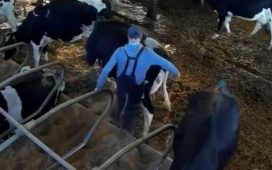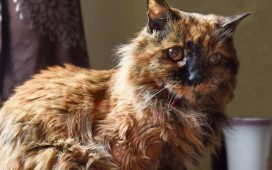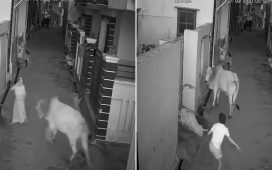Tomorrow is garden-waste bin collection day, so I’m on a rescue mission. Among those accumulated prunings and dead twigs, too tough to compost, there will be some accidental captives, gardening’s inevitable invertebrate collateral damage.
When I lift the lid, a seven-spot ladybird and two earwigs, on the rim of the bin and momentarily dazzled by sunlight flooding in, waken and tumble over the side, scuttling into crevices in the path. Garden snails raise their shells, extend stalked eyes, then glide to safety. But the animals I’m particularly keen to liberate are the candy-striped spiders. Until the garden-waste collection service started here and they began to appear under the bin lid in early autumn, I’d never noticed these colourful arachnids, probably because they usually hide, shielding that jewel-like egg cocoon, inside a rolled leaf.
Tiny but exquisite, Enoplognatha ovata would surely charm most arachnophobes, with its white abdomen streaked with crimson and pale yellow legs, clasping a ball of eggs cocooned in azure silk. If Fabergé made jewellery spiders, he might have chosen this species as a model. There are two of these little strawberries-and-cream liveried captives under the lid and they display strong maternal instincts. Neither retreats before the giant hand that picks them up on the edge of a leaf and releases them, still hugging their ball of eggs, into the grass.
Enoplognatha weaves a skimpy web but on this misty autumn morning, ornate, dew-spangled orb webs have also been spun. Lesser garden spiders, Metellina segmentata, have festooned the Michaelmas daisies with their spiral threads, where single females sit in each snare’s hub, while males loiter around the periphery. They’re waiting to grab and wrap a trapped fly, then present it to her as a pacifying gift, something to keep her poison fangs preoccupied while they mate safely.
Courting can be hazardous in the world of arachnids. Every morning, I come face to face with a large, female diadem spider, who weaves her orb web across our greenhouse doorway. She had a much smaller suitor but he disappeared. He might have wandered away, but Araneus diadematus is noted for sexual cannibalism, so after mating he may have been added to her daily diet of greenbottles and wasps.
Country diary is on Twitter/X at @gdncountrydiary








